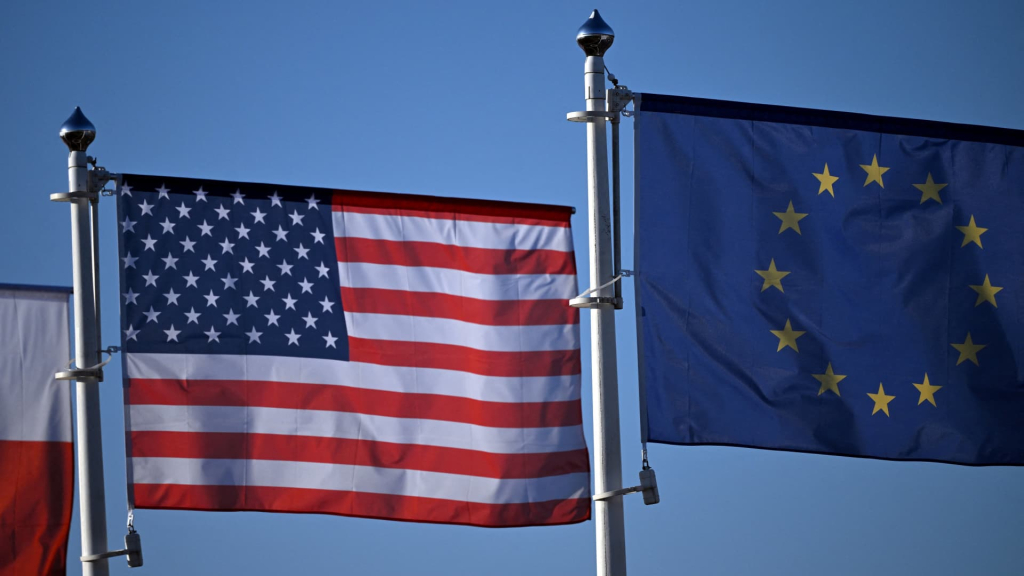The countdown is on for the U.S. and European Union as they approach a critical deadline to finalize a trade agreement regarding tariffs. Analysts suggest that lingering disagreements may hinder the possibility of reaching a consensus.
Following a temporary suspension of import duties that will last until July 9, both parties have been engaged in protracted negotiations. If they fail to secure an agreement by that date, a steep set of reciprocal tariffs—50% on EU goods—will come into force, alongside extensive countermeasures from the EU.
“We’re talking, but I don’t feel that they’re offering a fair deal yet,” President Donald Trump remarked to the press on Tuesday, further dampening expectations for a swift resolution.
What are the critical issues complicating discussions between partners with a trade relationship valued at 1.68 trillion euros ($1.93 trillion) in 2024?
Big tech regulation
Experts point to the EU’s regulation of large technology firms as a significant hurdle in the negotiations. The bloc has faced ongoing criticism from the U.S. for implementing landmark regulations that aim to enhance transparency and competition among tech giants
“The Trump administration is pressing for trade negotiations to compel the EU to relax its regulatory framework,” stated Alberto Rizzi, a policy fellow at the European Council on Foreign Relations. “Yet for Europeans, any interference in the regulation of digital platforms is unacceptable and contradicts their commitment to combat disinformation and hate speech,” he added.
Philip Luck, director of the economics program at the Center for Strategic and International Studies (CSIS), acknowledged these concerns but indicated that the EU might be willing to make certain concessions without compromising its core principles. However, he noted that the two sides have not engaged in discussions at that level yet.
Taxation
Taxation represents another contentious issue in the negotiations, according to Rizzi. President Trump considers tariffs an accounting measure for what he perceives as unfair taxes imposed on American businesses by European nations, notably through value-added taxes (VAT).
Though VAT is widely applied globally, the U.S. does not utilize this method, leading to its classification as a trade barrier by Trump. “However, from the EU’s perspective, the value-added tax treats domestic and foreign goods equally,” Rizzi pointed out. “Taxation, for the EU, is a strictly domestic matter and a red line in trade discussions.”
Mismatched worldviews
A broader concern appears to be a fundamental lack of trust and differing perspectives between Washington and Brussels regarding the negotiations and their objectives.
Jacob Kirkegaard, a non-resident senior fellow at the Peterson Institute for International Economics, asserted that the main sticking point lies in Trump’s desire for tariffs on the EU, which the bloc firmly opposes.
Similarly, CSIS’s Philip Luck noted the philosophical divide, with the U.S. administration approaching the discussions primarily in terms of how partners can concede to its demands, rather than engaging in a reciprocal exchange. “The EU approaches these negotiations traditionally; their proposal of zero-for-zero tariffs faced resistance from the White House,” he explained.
European leaders, identified as “proud people who view themselves as equals to the United States,” are unlikely to accept “constant” concessions, Luck added.
Will there be a deal?
The likelihood of the U.S. agreeing to a zero-for-zero tariff deal—or one that involves reduced tariffs for both sides—appears grim according to Luck. Furthermore, the EU may not achieve an agreement similar to that of the U.K., which accepted specific quotas and tariffs across certain sectors.
Luck elaborated that this is due to the EU’s resistance to replicate the U.K.’s terms as well as the U.S. administration’s broader complaints about European policies. However, he suggests that a scenario could arise where the EU may reluctantly concede to a lower tariff, like the existing 10% rate, due to necessity.
Rizzi also proposed the possibility of a “limited deal” that could involve freezing tariffs on select sectors. Yet he emphasized that this should not be interpreted as a signal that a comprehensive agreement is on the horizon.
Others, including Kirkegaard, remain doubtful. “My skepticism about a deal is high,” he remarked, suggesting it is more probable that no agreement is reached, prompting the EU to retaliate, which could lead to escalatory responses from the U.S. akin to the situation with China. He cautioned that a de-escalation and potential agreement may only come about after a significant level of economic strain is experienced.


























